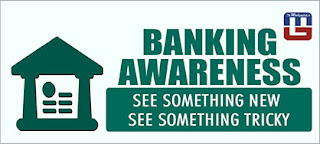Q1. A cheque is allowed to operate in which of the following accounts?
1) Both Saving and current accounts
3) Both current and fixed accounts
4) loan account only
5) none of the above
Ans- 1
प्र1. निम्नलिखित में से किन खातों में चेक को संचालित करने के लिए अनुमति दी गई है?
1) बचत और चालू खाता दोनों में
2) बचत और सावधि दोनों
3) चालू और सावधि दोनों खातो में
4) ऋण खाते में केवल
5) उपरोक्त में से कोई भी नहीं
उत्तर- 1
Q2. Many times we have heard a term called ‘Financial Inclusion’, What does it mean?
1)House to people at affordable price.
2)Ration facility at affordable price
3)Education at affordable price
4)Financial services at affordable cost to sections of disadvantaged and low income group of society.
5)All of the above
Ans-4
प्र2. कई बार हम 'वित्तीय समावेशन' शब्द सुनते है, इस शब्द का क्या अर्थ है?
1) किफायती मूल्य पर लोगों को घर।
2) किफायती मूल्य पर राशन की सुविधा
3) सस्ती कीमत पर शिक्षा
4) समाज के वंचित और कम आय वर्ग के वर्गों के लिए सस्ती कीमत पर वित्तीय सेवाएं।
5) उपरोक्त सभी
उत्तर-4
Q3. When a cheque from a bank is unpaid, then that cheque is called?
1) Not paid cheque
2) Dishonour of cheque
3) Cancelled cheque
4) Cheque not drawn
5) Signature differ
Ans-2
प्र3. जब एक बैंक से किसी चेक का भुगतान न हो तो उसे क्या कहा जाता है?
1) चेक का भुगतान नहीं
2) चेक का अनादरण
3) रद्द चेक
4) अनआहरित चेक
5) हस्ताक्षर अलग
उत्तर-2
Q4. Mortgage in a bank means.
1) Security of immovable property for a loan given by bank
2) Security of any movable property
3) Unsecured Property on which bank has no charge
4) Moratorium period for which bank has to give interest for a loan
5) Any kind of loan given by bank which is on immovable property
Ans-1
प्र4. बैंकिंग के सम्बन्ध में बंधक का क्या अर्थ है?
1) बैंक द्वारा दिए गए ऋण के लिए अचल संपत्ति की सुरक्षा
2) किसी भी चल संपत्ति की सुरक्षा
3) असुरक्षित संपत्ति जिसपर बैंक का कोई शुल्क नहीं है
4) अधिस्थगन अवधि के लिए बैंक को ऋण के लिए ब्याज देना पड़ता है
5) किसी भी तरह का बैंक द्वारा दिया गया ऋण जो अचल संपत्ति पर है
उत्तर-1
Q5. Which of the following statement is true?
1) The NSE was started in 1992.
2) A bond is a negotiable certificate evidencing indebtedness.
3) The government of India enacted the SEBI Act ,1992,on 4 April 1992
4) IPO is the offering that is made when unlisted company makes either a fresh issue of securities to the public.
1) Only 1
2) Only 3 and 4
3) Only 4
4) Both 1 and 2
5) All are true
Ans-5
प्र5. निम्नलिखित में से कौन सा कथन सही है?
1) NSE 1992 में शुरू किया गया था।
2) एक बांड जो की परक्राम्य प्रमाण पत्र ऋणग्रस्तता साक्ष्य है।
3) भारत सरकार द्वारा अधिनियमित सेबी अधिनियम, 4 अप्रैल 1992 पर अस्तित्व में आया
4) आईपीओ की पेशकश एक गैर-सूचीबद्ध कंपनी द्वारा जनता के लिए ताज़ा प्रतिभूतियों को जारी करना है|
1) केवल 1
2) केवल 3 और 4
3) केवल 4
4) 1 और 2 दोनों
5) सभी सत्य हैं
उत्तर-5
Q6. Which of the following is not an office of the Reserve Bank of India?
1) Kanpur
2) Lucknow
3) Gulbarga
4) Bhopal
5) Jaipur
Ans-3
प्र6. निम्नलिखित में से कहाँ पर भारतीय रिज़र्व बैंक का कार्यालय नहीं है?
1) कानपुर
2) लखनऊ
3) गुलबर्ग
4) भोपाल
5) जयपुर
उत्तर-3
Q7. Which of the following deposits are not allowed by banks from an Indian person?
1) Salaries earned abroad
2) Money received as gifts
3) Money earned from Non-legal sources
4) Foreign exchange earned as advisory charges
5) All of the above
Ans -5
प्र7. भारत में बैंक किसी व्यक्ति को निम्न में से कौन सा धन जमा करने की अनुमति नहीं देता?
1) विदेश में अर्जित वेतन
2) उपहार के रूप में प्राप्त धन
3) गैर – क़ानूनी स्रोतों से अर्जित धन
4) सलाहकारी प्रभार के रूप में अर्जित विदेशी मुद्रा
5) उपरोक्त सभी
उत्तर-5
Q8. Which of the following is the main purpose of KYC?
1) To provide better customer service
2) High-value transactions faster
3) to take control of the margin money
4) More and more people bring in water tax
5) None of these
Ans -3
प्र8. निम्नलिखित में से अपने ग्राहक को जानिए का मुख्य उद्देश्य क्या है?
1) बेहतर ग्राहक सेवा प्रदान करना
2) उच्च मूल्य वाले लेनदेन तेजी से करना
3) धन मार्जिन पर नियंत्रण रखना
4) अधिक से अधिक लोगो को आयकर के अंतर्गत लाना
5) इनमे से कोई नहीं
उत्तर-3
Q9. How long a person have foreign currency, if he returning from abroad?
1) 60 days
2) 70 days
3) 30 days
4) 180 days
5) 90 Days
Ans -5
प्र9. विदेश से लौटने वाला व्यक्ति विदेशी मुद्रा कितने समय तक रख सकता है?
1) 60 दिन
2) 70 दिन
3) 30 दिन
4) 180 दिन
5) 90 दिन
उत्तर-5
Q10. Which of the following cannot open a no-frills account in the bank?
1) Agricultural labourer
2) Student
3) small firm selling luxury merchandise
4) Farmers
5) Unorganized sector workers
Ans -3
प्र10. निम्नलिखित में से कौन बैंक में नो फ्रिल खाता नहीं खोल सकता?
1) कृषि मजदूर
2) विद्यार्थी
3) विलास की वस्तुए बेचने वाली छोटी फर्म
4) कृषक
5) असंगठित क्षेत्र का मजदूर
उत्तर-3





.jpg)
0 comments:
Post a Comment
MAHENDRA GURU